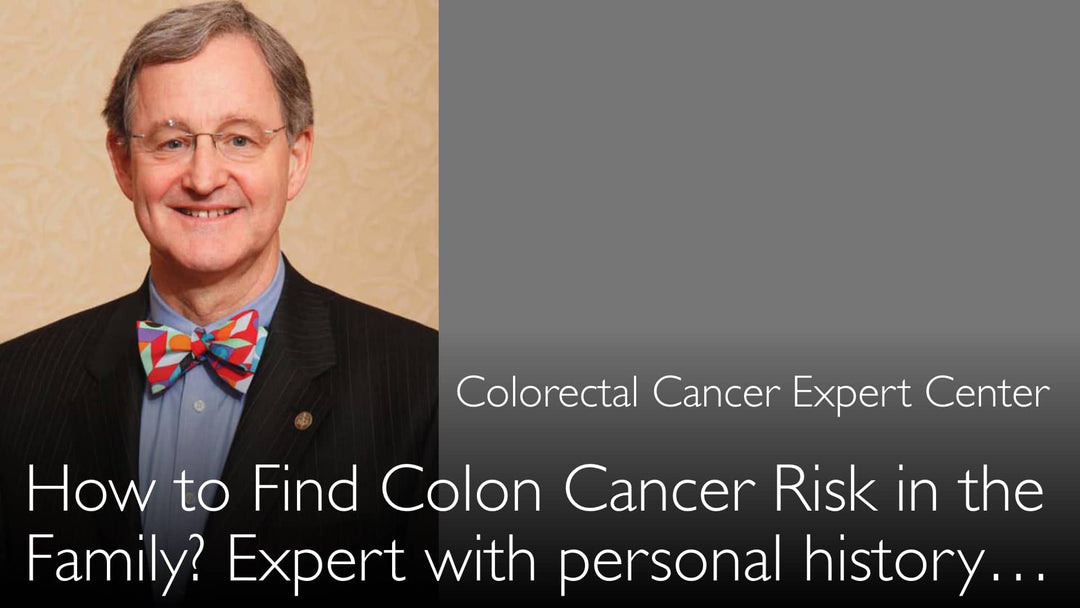Den førende ekspert i kolorektalkræftgenetik, Dr. C. Richard Boland, forklarer, hvordan familiære tyktarmskræft-syndromer udvikler sig gennem forskellige genetiske veje, herunder Lynch-syndrom, adenomatøs polyposis og sjældnere tilstande som juvenil polyposis og Peutz-Jeghers syndrom. Han understreger, hvordan indsigt i disse arvelige mønstre afslører, at kolorektalkræft i virkeligheden er en samling af særskilte sygdomme med varierende behandlingsrespons.
Arvelige årsager til familiær tyktarmskræft: Syndromer og behandlingsimplikationer
Spring til afsnit
- Oversigt over familiær tyktarmskræft
- Forklaring på Lynch-syndromet
- Adenomatøs polyposis og APC-genet
- Sjældne arvelige syndromer
- Tyktarmskræft som forskellige sygdomme
- Diagnostik og behandlingsimplikationer
- Fuld transskription
Oversigt over familiær tyktarmskræft
Ifølge dr. C. Richard Boland, MD, skyldes 10–25 % af tilfælde af familiær tyktarmskræft Lynch-syndromet, mens andre arvelige årsager udgør yderligere arvelige mønstre. Tidlig debut af tyktarmskræft på tværs af generationer indikerer ofte disse arvelige syndromer, som hver især har særlige biologiske mekanismer, der driver kræftudviklingen.
Forklaring på Lynch-syndromet
Som dr. Boland forklarer, skyldes Lynch-syndromet defekter i DNA-reparationsmekanismer snarere end dannelse af polypper. Selvom adenomer dannes med normal hastighed, adskiller syndromet sig ved, at de hurtigt udvikler sig til kræft. Dette forklarer, hvorfor patienter med Lynch-syndrom ofte får tyktarmskræft før de fylder 50, hvilket kræver specialiserede overvågningsprotokoller.
Adenomatøs polyposis og APC-genet
Mutationer i APC-genet forårsager familiær adenomatøs polyposis (FAP), hvor hundredvis af polypper dannes på grund af ukontrolleret celledeling. Dr. C. Boland, MD, bemærker, at selvom enkelte polypper har lav kræftrisiko, gør den store mængde malignitet uundgåelig. Dette står i kontrast til Lynch-syndromets reparationsbaserede mekanisme og viser, hvordan forskellige mekanismer kan føre til lignende kliniske resultater.
Sjældne arvelige syndromer
Dr. C. Richard Boland, MD nævner to sjældne tilstande: Juvenile Polyposis Syndrome (forårsaget af mutationer i tumorsuppressor-gener) og Peutz-Jeghers Syndrome (forbundet med inaktivering af kinas-gener). Disse udgør en lille andel af arvelige tilfælde, men giver vigtig indsigt i tyktarmskræftens biologi gennem deres unikke genetiske signaturer.
Tyktarmskræft som forskellige sygdomme
Dr. C. Boland, MD forklarer, at genetisk forskning har ændret vores forståelse af tyktarmskræft fra én sygdom til et spektrum af forskellige tilstande. Dr. C. Boland, MD understreger, at denne mangfoldighed forklarer, hvorfor nogle tumorer reagerer på standardbehandlinger, mens andre er resistente, hvilket gør skræddersyede tilgange nødvendige baseret på hver tumors molekylære profil.
Diagnostik og behandlingsimplikationer
Dr. C. Richard Boland, MD fremhæver, at anerkendelse af disse genetiske forskelle muliggør målrettet forebyggelse og behandling. For familier med høj risiko kan genetisk testning identificere specifikke syndromer tidligt, hvilket muliggør tilpassede overvågnings- og forebyggende foranstaltninger. Dette paradigmeskift mod præcisionsmedicin forbedrer udfaldene ved at tilpasse indgreb til hver patients unikke genetiske risikofaktorer.
Fuld transskription
Dr. Anton Titov, MD: Kan tyktarmskræft være arvelig? Hvad siger debutalderen for tyktarmskræft om mulige genetiske årsager? Hvilke typer af familiær tyktarmskræft er almindelige?
En førende ekspert i tyktarmskræftgenetik diskuterer tyktarmskræft. Lad os tale om andre familiære tyktarmskræftsyndromer. Det er dr. Anton Titov, MD. Men Deres livslange interesse og præstationer inden for tyktarmskræftbehandling og -forskning drives ikke kun af videnskabelig nysgerrighed, men også af Deres families personlige historie.
De har netop udgivet en bog med titlen "Cancer Family: The Search for the Cause of Hereditary Colorectal Cancer." I bogen fortæller De en dramatisk historie om flere generationer af Deres egen familie. Mange medlemmer af Deres familie fik tyktarmskræft i en ung alder.
Dr. Anton Titov, MD: Vi har allerede talt om ét familiært tyktarmskræftsyndrom—Lynch-syndromet. Men Lynch-syndromet står kun for omkring 10 til 25 % af tilfælde af familiær tyktarmskræft. Hvad ved vi om andre genetiske årsager til tyktarmskræft, som kan forekomme i flere generationer af en familie?
Dr. C. Boland, MD: Forståelsen af arvelig tyktarmskræft har lært os enormt meget om sygdommens udvikling. Det allerførste gen for arvelig tyktarmskræft, der blev opdaget, var APC-genet. Arvelige mutationer i APC-genet forårsager adenomatøs polyposis.
Hvad der sker er, at når APC-genet inaktiveres, får man ukontrolleret celledeling. Så man udvikler mange polypper i tyktarmen. Efterhånden vokser polypperne. Når der er så mange polypper—selvom hver enkelt statistisk set har lav risiko for at blive til kræft—bliver sandsynligheden for tyktarmskræft overvældende.
I adenomatøs polyposis afhænger risikoen for tyktarmskræft af ændringer i væksten af polypper. I Lynch-syndromet skyldes risikoen et problem med DNA-reparation. Kolonadenomer opstår med normal hyppighed, så vidt vi ved. Men på grund af DNA-reparationsproblemet har disse adenomer en tendens til at blive kræftfremkaldende på kort tid.
Der er nogle andre relativt sjældne arvelige tyktarmskræfttilstande. De involverer helt andre gener. Men disse andre arvelige tyktarmskræftsyndromer er ret sjældne.
Et af dem er Juvenile Polyposis Syndrome. Flere gener kan forårsage det—disse er inaktiverende mutationer i tumorsuppressor-gener. Patienter mister tumorsuppressor-funktionen, hvilket kan føre til kræft.
En anden arvelig mutation i et kinas-gen forårsager Peutz-Jeghers syndrom, når det inaktiveres.
Dr. C. Boland, MD: Efterhånden som vi har afdækket årsagen til hvert af disse syndromer, har vi lært mere om tyktarmskræft. Den uventede opdagelse er denne: Vi har altid troet, at tyktarmskræft var én ensartet sygdom, men nu ved vi, at tyktarmskræft faktisk er en samling af meget forskellige sygdomme.
Dette forklarer, hvorfor nogle tyktarmskræfttilfælde reagerer på standardbehandlinger, mens andre slet ikke gør. De er simpelthen forskellige sygdomme.





